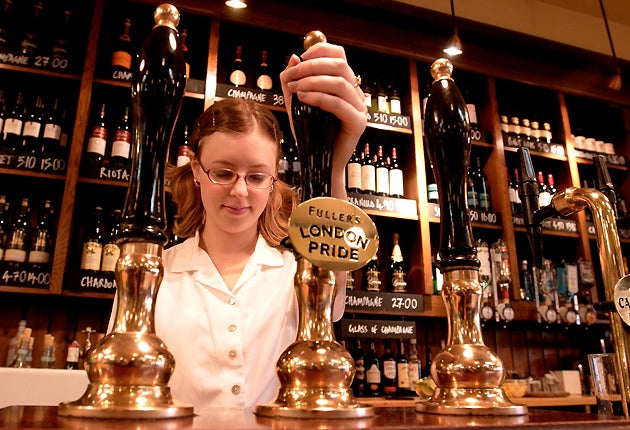Cask Ale: As British as the Royal Family
Britain's national drink is helping keep pubs alive. By Pete Brown

Italian food. French wine. British beer and pubs. Our national icons resonate deeply not just because they're things we're good at, but also because they reflect our national characteristics. To eat like an Italian is to treat great food with the gusto and relish it deserves. A Margaux reflects centuries of sophistication and refinement. And a pint of ale in a pub... well, it's a bit more complicated.
Pubs are different from the bars the rest of the world has to make do with. They're more convivial, more homely, diverse, eccentric, understated and contradictory. They can be a bit intimidating on a first encounter, but get to know them and you'll never want to leave. Just like the average Brit, really.
That's why there has never been a successful British soap without a pub at its centre. After the Royal Family, the traditional British pub is the first thing foreign tourists want to see when they come to Britain. And when they're there, they want to drink a traditional British beer.
Beer and pubs are like bacon and eggs, Morecambe and Wise, Glastonbury and mud. You can have one without the other, but it's not quite right.
In simple sales terms, we may be more wine and lager these days. But British ale (call it real ale, cask-conditioned ale, cask ale, hand-pulled ale – just to add to that contradiction and confusion we were talking about earlier) continues to set the British beer and pub tradition apart from the rest of the world.
A few years ago, cask ale was in a seemingly terminal sales decline, and its drinkers had to endure comments about flat caps, beards, socks with sandals and Morris dancing.
How quickly things change. Cask ale is (and always has been) a natural, crafted, flavourful product. As such, it's the ideal drink for our aspiring foodie obsession, the perfect pint to relax with after picking up your 28-day hung beef, artisanal bread and selection of complicated cheeses from the farmers' market. After years of decline, it's back in positive growth, recruiting a new generation of young, flavour-hungry drinkers (bearded and clean-shaven). The number of women drinking it nearly doubled in the past year. Scores of new microbreweries are opening every year, and there are now more working breweries in Britain than at any time since the Twenties.
Pubs are going through a difficult time, with an average of 39 closing their doors for good every week. But cask ale is only available in pubs, and pubs that stock it and keep it well are, as a rule, doing a lot better than pubs that don't. Cask ale is Britain's national drink. And it's helping to keep alive the national institution of the great British pub.
It's part of a global revolution in beer, with discerning drinkers the world over rejecting flavourless, mass-produced beer brands in favour of crafted ales and quality lagers. Good pubs across the country increasingly stock bottled craft beers from Belgium, Germany and the United States. But while these countries brew some great beers, none of them pulls off the trick that British cask ale can: brewing beers at relatively low alcohol strengths (3.6 - 4.5% ABV) that are nevertheless packed with flavour.
A Belgian Tripel or American IPA need to be approached with caution, but a standard cask ale can deliver lip-smacking citrusy aromas balanced on a crunchy caramel base and still leave you with a relatively clear head after a pint or two. Among all its other virtues, as alcohol is increasingly portrayed as harmful, if you really do want to drink responsibly and still enjoy yourself, you can't beat a pint of cask ale.
If there's a problem with cask ale, it's that it's a little more difficult than other beers to keep well. It's a natural product with live yeast working in the barrel, and demands a bit more skill and attention. A barrel that leaves the brewery in perfect condition can leave a lot to be desired in the glass if it's been through the wrong hands to get there.
But finding the perfect pint is much easier than it used to be, thanks to Cask Marque (www.cask-marque.co.uk). This independent organisation fields a team of inspectors who evaluate pubs on their cellaring and serving of beer, checking factors such as cleanliness and the storage of, and method of dispensing, cask ale.
Pubs which pass can display the Cask Marque plaque. More than six thousand pubs – over one in ten – now have Cask Marque accreditation, and where you see the plaque you can be sure of a good pint.
You're probably sitting not very far from one right now. There's a lot of beery reading here to get through. So why not check out the website , find your nearest Cask Marque pub, pop over there and get yourself a pint before reading on. Go on. You know you want to.
Pete Brown is the British Guild of Beer Writers' beer writer of the year
Subscribe to Independent Premium to bookmark this article
Want to bookmark your favourite articles and stories to read or reference later? Start your Independent Premium subscription today.

Join our commenting forum
Join thought-provoking conversations, follow other Independent readers and see their replies